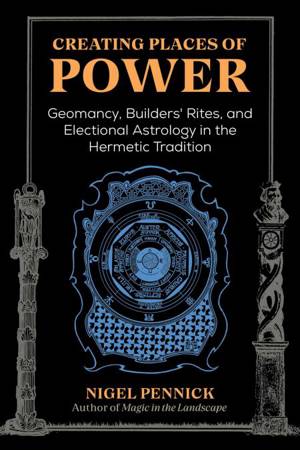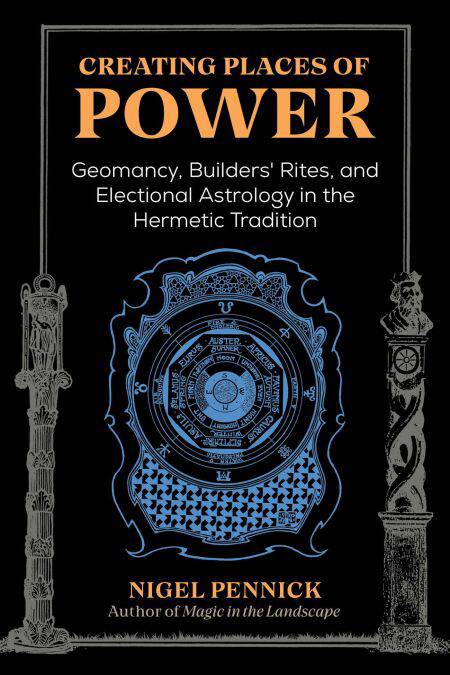
- Afhalen na 1 uur in een winkel met voorraad
- Gratis thuislevering in België vanaf € 30
- Ruim aanbod met 7 miljoen producten
- Afhalen na 1 uur in een winkel met voorraad
- Gratis thuislevering in België vanaf € 30
- Ruim aanbod met 7 miljoen producten
Zoeken
Creating Places of Power E-BOOK
Geomancy, Builders' Rites, and Electional Astrology in the Hermetic Tradition
Nigel Pennick
E-book | Engels
€ 19,00
+ 19 punten
Uitvoering
Omschrijving
An exploration of the traditional rites of auspicious building and crafting
• Explains the ceremonial beginnings and Hermetic principles in the laying out of foundations not only for sacred buildings like temples but also for homes and barns
• Examines the principles and ceremonies of electional astrology and details how to compute natural time, as opposed to clock time
• Shares examples from ancient Egypt, Iran, India, and Europe that range from the Stone Age to the Renaissance and include secret societies
When we make things--whether a building, a sacred space, or a magical object--there is a precise moment when the artifact comes into being as a separate entity. That moment in time possesses its own unique quality, and because of this, there is a right time to do something and a wrong time. And, as Nigel Pennick reveals, we have the power to select favorable moments for our creations, just as our ancestors did.
Illustrating ancient principles of divination, chronomancy, and electional astrology, Pennick examines all the factors behind the ancestral art of geomancy: the auspicious creation and alignment of sacred buildings as places of power. Sharing examples from ancient Egypt, Iran, India, and Europe that range from the Stone Age to the modern day, including secret societies like the Rosicrucians and the Freemasons, he explains how many cities were constructed on specially selected sites and founded ritually at precise, predetermined moments.
Looking at the traditional rites of creating places of power, Pennick explains the ceremonial beginnings and Hermetic principles in the laying out of foundations as well as the use of sacrifice in the building of many notable structures. Examining the role of sacred geometry in geomancy, Pennick explains the Hermetic meaning assigned to each direction in traditional European cultures as well as the principles of natural measures and the science of understanding lucky and unlucky days.
Revealing how geomantic principles are rooted in the structure of the world and the cosmic patterns of space and time, the author shows how they transcend the ages and are just as meaningful today as they were to our ancestors.
• Explains the ceremonial beginnings and Hermetic principles in the laying out of foundations not only for sacred buildings like temples but also for homes and barns
• Examines the principles and ceremonies of electional astrology and details how to compute natural time, as opposed to clock time
• Shares examples from ancient Egypt, Iran, India, and Europe that range from the Stone Age to the Renaissance and include secret societies
When we make things--whether a building, a sacred space, or a magical object--there is a precise moment when the artifact comes into being as a separate entity. That moment in time possesses its own unique quality, and because of this, there is a right time to do something and a wrong time. And, as Nigel Pennick reveals, we have the power to select favorable moments for our creations, just as our ancestors did.
Illustrating ancient principles of divination, chronomancy, and electional astrology, Pennick examines all the factors behind the ancestral art of geomancy: the auspicious creation and alignment of sacred buildings as places of power. Sharing examples from ancient Egypt, Iran, India, and Europe that range from the Stone Age to the modern day, including secret societies like the Rosicrucians and the Freemasons, he explains how many cities were constructed on specially selected sites and founded ritually at precise, predetermined moments.
Looking at the traditional rites of creating places of power, Pennick explains the ceremonial beginnings and Hermetic principles in the laying out of foundations as well as the use of sacrifice in the building of many notable structures. Examining the role of sacred geometry in geomancy, Pennick explains the Hermetic meaning assigned to each direction in traditional European cultures as well as the principles of natural measures and the science of understanding lucky and unlucky days.
Revealing how geomantic principles are rooted in the structure of the world and the cosmic patterns of space and time, the author shows how they transcend the ages and are just as meaningful today as they were to our ancestors.
Specificaties
Betrokkenen
- Auteur(s):
- Uitgeverij:
Inhoud
- Aantal bladzijden:
- 336
- Taal:
- Engels
Eigenschappen
- Productcode (EAN):
- 9781644115855
- Verschijningsdatum:
- 28/11/2022
- Uitvoering:
- E-book
- Beveiligd met:
- Adobe DRM
- Formaat:
- ePub

Alleen bij Standaard Boekhandel
+ 19 punten op je klantenkaart van Standaard Boekhandel
Beoordelingen
We publiceren alleen reviews die voldoen aan de voorwaarden voor reviews. Bekijk onze voorwaarden voor reviews.








